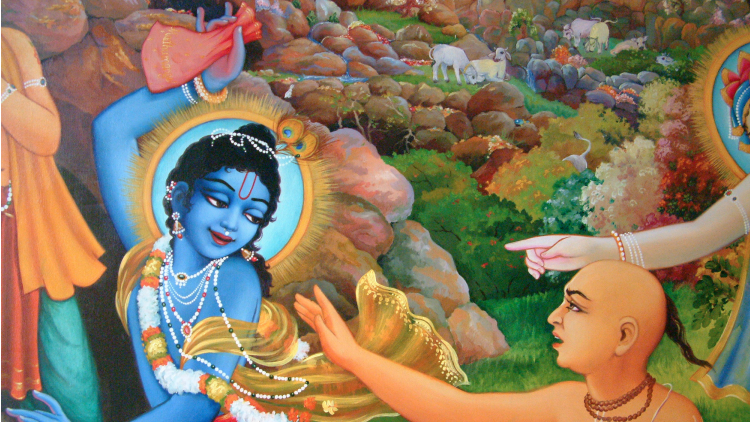The God Who Conceals His Godhood So That Love Can Reign
By Chaitanya Charan Das | Сен 06, 2013

God. The word evokes various images in people’s minds. Some think of God as a cosmic judge seated on a celestial throne. Others envision him as an ageless sage with a long white beard. Still others conceive of him as an all-pervading spirit.
Whatever people may conceive God to be, they wouldn’t conceive him to be a fun-loving bluish-black cowherd. Or would they? One-sixth of humanity does indeed conceive of God thus. A billion Hindus believe that God is a flute-playing, peacock-feather-wearing, sixteen-year-old youth named Krishna who plays in a pastoral paradise with his cows, his boyfriends and his girlfriends.
Such a vision of God might seem too fanciful to merit serious attention. But surprisingly it has been elucidated by some of the greatest minds in the Vedic wisdom-tradition that originated in the world’s most ancient sacred literature, the Vedas. The Vedic wisdom-tradition has survived, even flourished, over millennia and continues to do so even today. Among the many books in this tradition that describe Krishna’s godhood, the most well-known is the philosophical masterpiece, the Bhagavad-gita. Therein, Krishna’s godhood is not only explained philosophically and theologically. It is also demonstrated dramatically in the vision of the Universal Form, one of the most mystical visions in world-literature. In that vision, the entire universe in all its complexity, variety and activity is seen to be present within the form of Krishna, hence its name: the Universal Form.
Visions like these, though demonstrating Krishna’s godhood, are not what have captured the hearts of millions of worshipers for millennia. Devotees have been in love with a far more intimate and sweet manifestation of Krishna as he is at his home in a pastoral paradise known as Vrindavan. This manifestation reveals a refreshing new dimension of God’s perfection.
God is universally understood as the perfect being. His perfection has been conventionally conceived as a frozen perfection like, say, that of a perfect painting. When a painting is being made, it becomes perfect at a particular point in its making. One stroke less and it is not that good. One stroke more and again it is not that good.
Similarly, the idea went, for God to be perfect, he has to be frozen. If he has any desire or if he does any action, both indicate that his present state is lacking in something because of which he desires and acts.
Such an intellectualized notion of God might be analytically perfect, but it is emotionally impotent. After all, how long can one love someone who never desires or does anything?
The Vedic wisdom-tradition reveals that God’s perfection is not the static perfection of a dead painting, but the dynamic perfection of a loving person. Love by its very nature induces reciprocations among the lovers. Love becomes perfect not when these reciprocations freeze but when everything else freezes so that these reciprocations can go on undistracted – or, even better, when everything else contributes to intensifying these loving reciprocations.
The arena where this happens is the kingdom of God. To enable love to attain the zenith of perfection, God removes conceals his godhood. Among the community of his most intimate devotees, he acts like just another member – the sweetest and most lovable member, no doubt, but still just another member. To remove any residual inhibitions, he avoids a royal setting for these reciprocations but instead chooses a pastoral setting: an idyllic village surrounded by a beautiful forest. This pastoral paradise is known as Vrindavan. And for himself he chooses the undistinguished vocation of a cowherd. Not even the king of cowherds, but the prince of cowherds.
The God who thus conceals his supremacy so that love can reign supreme is Krishna. Janamshtami is the day when Krishna descends to this world to invite all of us back to the world where love reigns supreme.















